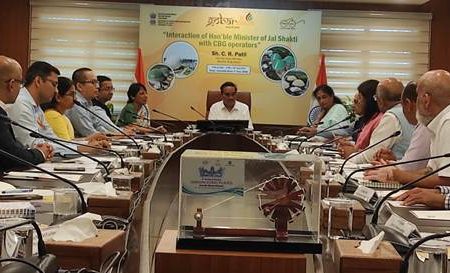New Delhi: To assess the strides made and gather insights on the GOBARdhan Initiative, aimed at converting organic waste into valuable resources like Compressed Biogas (CBG) and organic manure, Union Minister for Jal Shakti, C. R. Paatil, convened a crucial meeting today in New Delhi with CBG producers and key stakeholders of the sector.
The gathering witnessed active participation from representatives of stakeholder Ministries/Departments, CBG operators, and prominent organizations in the sector. This interaction underscored the government’s steadfast commitment to fostering innovative and sustainable solutions in waste management.
Expressing gratitude to Prime Minister Narendra Modi for envisioning the GOBARdhan initiative, Minister Paatil emphasized its pivotal role in advancing India’s environmental sustainability goals. He remarked, “By harnessing organic waste into valuable assets, we are not only safeguarding our environment but also creating employment opportunities and promoting overall health and wellbeing. The government remains dedicated to bolstering this critical sector to achieve long-term environmental objectives.”
During the session, CBG producers highlighted several challenges, notably the excessive use of chemical fertilizers and the absence of a robust mechanism for carbon credit trading within the CBG sector. They underscored the detrimental impact of chemical fertilizers on soil health and advocated for promoting bio-fertilizers, specifically Fermented Organic Manure (FOM) and Liquid Fermented Organic Manure (LFOM), to restore soil carbon balance. They urged for increased Farmer Educational programs and proposed exploring bundled fertilizer schemes to address these concerns effectively.
The industry representatives also underscored the potential of carbon credits as a significant revenue source for the sector and urged the government to expedite the establishment of mechanisms to incentivize CBG projects further. They highlighted the Union Budget 2023-24’s announcement to establish 500 new waste-to-wealth plants as a transformative step for the GOBARdhan initiative. Currently, there are 113 operational CBG plants, with 667 plants in various stages of development and 171 plants under construction, showcasing substantial growth in the sector.
Over the past few years, the number of functional CBG units has surged from 19 in 2020 to 113 presently, underscoring the sector’s robust expansion trajectory. The government has implemented various policy enablers to bolster the viability and scalability of CBG plants, fostering a circular economy and sustainable development.
Minister Paatil assured comprehensive support from the government to address the industry’s concerns and facilitate a conducive environment for the CBG sector’s growth. He reiterated the government’s commitment to nurturing initiatives like GOBARdhan, which not only mitigate environmental challenges but also contribute to India’s journey towards achieving net zero emissions.

